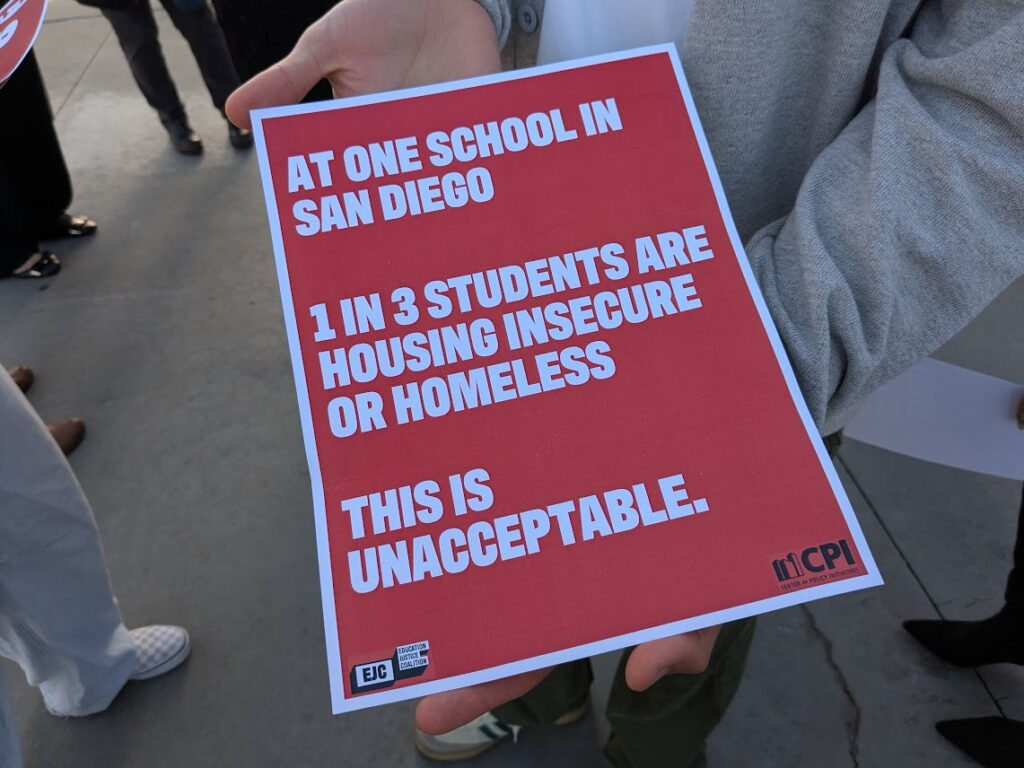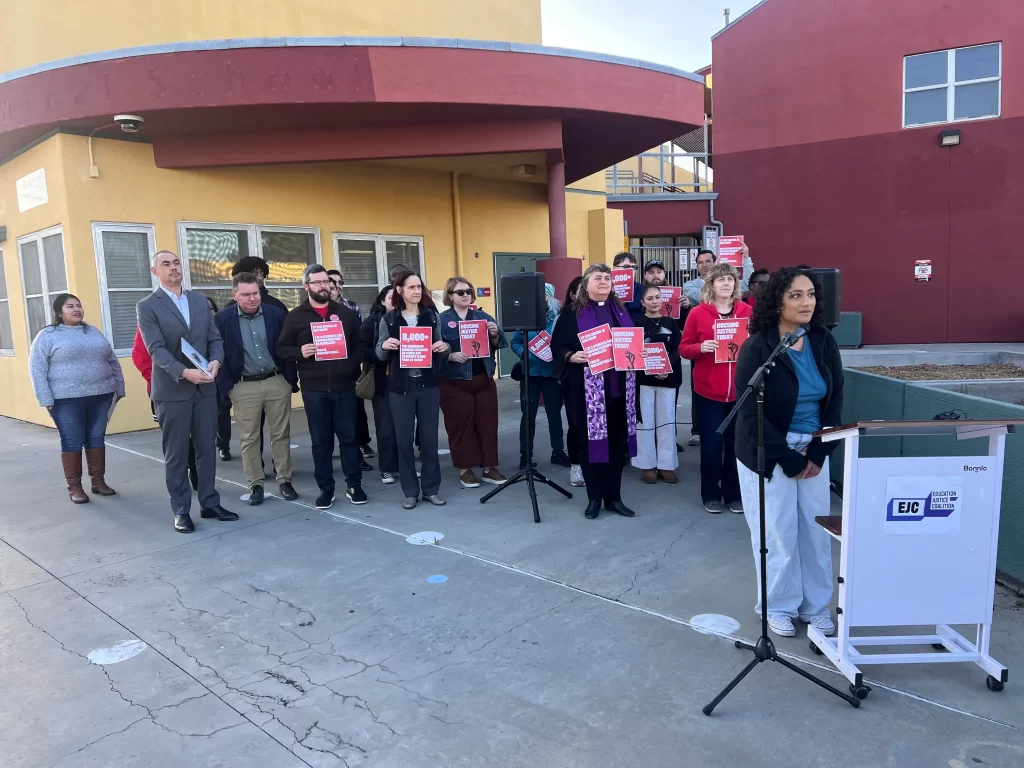Budget Input Sessions
The SDEA Bylaws give members the opportunity to provide feedback on the SDEA Budget. There are two virtual budget input sessions scheduled to give input for the 2025-26 Budget. To attend, RSVP using the links below:
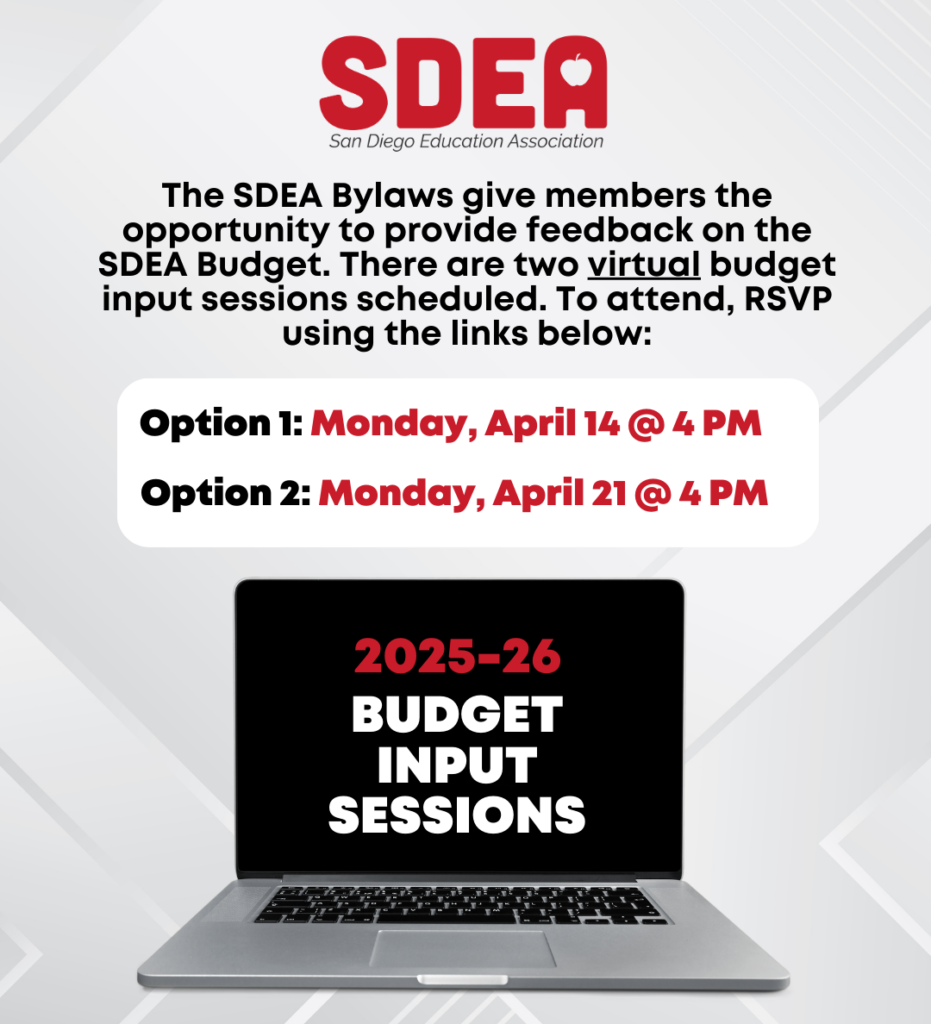
The Standard: Switch Through April 30
SDEA members, are you already enrolled in The Standard? Your opportunity to switch to The Standard for your CTA-endorsed Disability is now available! Apply now with no health questions asked!
Bargaining Update - March 27, 2025

With an executive order threatening to dismantle the Department of Education, the fight for public education funding has never been more urgent. Any Federal cuts will hit programs like Special Education the hardest, where educators are already stretched beyond capacity. Now more than ever, we must secure a strong local contract and robust state funding to protect our schools and ensure students and educators receive the resources they need.
In our second bargaining session, SDEA members on the Bargaining Team focused on staffing and additional proposals ensuring stability for our schools and communities. Read more about our proposals below.

Our proposals from this session address critical staffing shortages while strengthening contractual protections to prevent overloading educators. Our students deserve more than the bare minimum! We need staffing that allows students and educators to thrive, not just survive.
Special Education Staffing:
The shortage of Special Education staff is a crisis impacting our whole community. SDEA members are still waiting on a fair grievance settlement for caseload violations in previous school years, but delayed annual settlements don’t solve the root issue of ongoing vacancies in Special Education that lead to unsustainable workloads and students not getting the support they need. Our proposed changes to Article 29: Special Education aim for more concrete solutions:
- Addressing the District’s inability to staff Special Education with a monthly stipend for educators over caseload, to ensure timely compensation.
- A monthly Case Management Day for Ed Specialists and protected time to complete necessary paperwork and communications.
- A pathway for educators to add a Special Education credential paid for by the District, to help fill vacancies (building off the initial agreement to offset retirements in this year’s Supplemental Early Retirement Program.)
- Increased allocation of School Psychologists, improved caseloads for Speech Language Pathologists, and caseload and IEP caps for Early Childhood Special Education classes to support our highest need students.
Transitional Kindergarten Staffing:
Many of the proposed changes regarding TK come from language agreed upon in 2021 with the establishment of TK classrooms staffed with Multiple Subject and Early Childhood Education co-teachers. The District has already announced that TK class sizes will be reduced from 24 to 20 students in the 2025-26 school year, which aligns with new state law. Our proposed contractual changes ensure that the District maintains the co-teaching model and appropriately staffs schools to support our youngest students during the entire school day. See all proposed changes in Article 8: Hours of Employment and Article 13: Class Size.
Additional staffing proposals:
- Protect educator prep time and prioritize shared decision-making to make sure educators have a voice in the decisions that impact their work. See all proposed changes to Article 8: Hours of Employment and the related Appendix H: Part-Time Certificated Assignments.
- Increase elementary prep and enrichment allocation in Appendix M.
- Limit combo classes and a new school-based Mental Health Counselor position to address growing student social-emotional and behavioral needs and ensure a full-time nurse at specialized schools. See all proposed changes to Article 13: Class Size.
- Expand job-sharing opportunities to retain educators in our district even when they cannot work full time. See all proposed changes to Article 21: Job Sharing.
- Prioritize staffing Summer School & Intersession by seniority, and ensure educators can use any available sick leave during summer school. See all changes to Article 17: Summer School/Intersession Hours & Conditions of Employment.
To expand on the proposals already submitted in February, we proposed changes to two additional articles which would ensure stability for our students and communities:
- Finally end the unnecessary chaos of Fall Transfers (or “Excessing”) using findings from the joint committee which has been working to minimize the disruption of Fall excessing. See all proposed changes to Article 12: Transfer Policies.
- Ensure community voices are centered in our Community Schools by empowering Community School Site Governance Teams and expanding culturally-sustaining and community-based curriculum. See all proposed changes to Article 36: Community Schools.
It’s time to pay educators!
At our first bargaining session, we proposed a combined 10% salary increase by 2026 including a retroactive 2% raise for the current school year that would help cushion the blow of San Diego experiencing the highest cost of living increase in the country. According to the District’s 2nd Interim Budget presentation, the District is projected to end the current fiscal year with at least $75 million in addition to the 2% required minimum reserve. It is clear that the District can afford an educator salary increase that will alleviate the growing staffing crisis and keep the highest quality educators in our schools. Now is the Time for district leadership to settle the raise for this year and get our students the support that they deserve!
Make sure the District knows: We Can’t Wait!
With the majority of our proposals on the table, it’s time to turn up the pressure. Rolling pickets at schools across the city starting Monday, April 28 will show the District that we mean business as they consider how to respond to our demands. The more members, families and community allies that show up, the stronger our message: It’s time for the District to prioritize resources for our schools and for our students! We Can’t Wait! Make sure to attend your next union meeting to stay informed, stay engaged, and get ready to take action together!
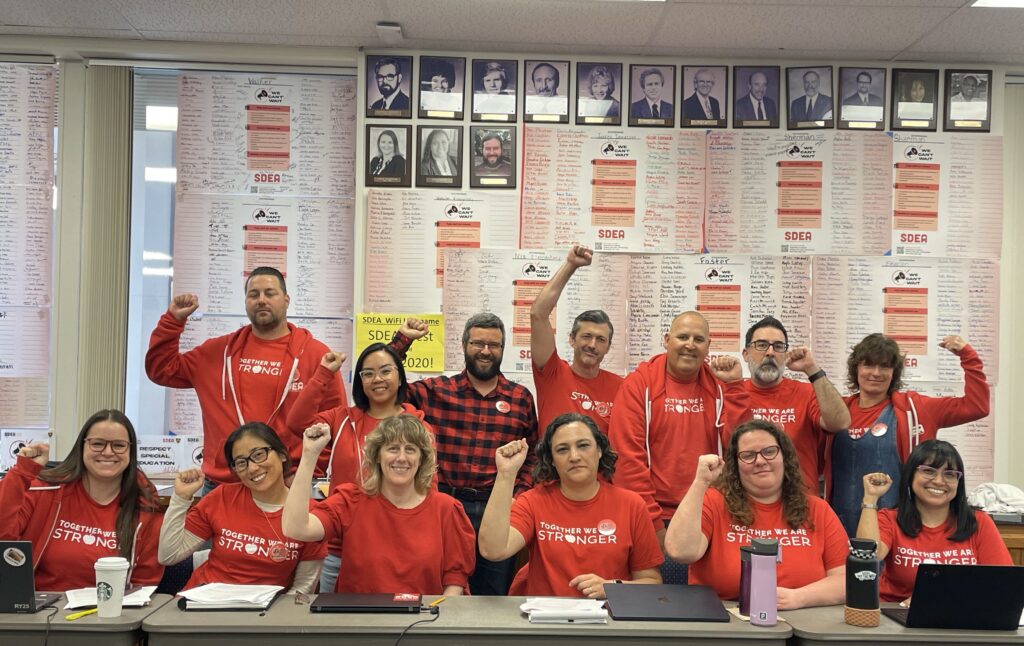
During bargaining, the walls were covered with petitions signed last month, to remind the District of the people power beyond the faces they see at the bargaining table.
Stay Informed:
Our next bargaining session is scheduled for April 24, 2025. See an updated list of all articles we will be negotiating this year and our bargaining proposal tracker to keep track of ongoing negotiations.
In Solidarity,
SDEA’s Bargaining Team
Kyle Weinberg, SDEA President, Laurie Bailon, Restorative Justice Teacher, Bell MS; Carly Bresee, Ed. Specialist: Moderate/Severe, Perkins K-8, Sarah Darr, SDEA Secretary, WCW Campaign Organizer & Senior SLP; Christina Gallegos, ECSE Teacher, Rodriguez ES; Candace Gyure, School Nurse; Stacy Hernandez, SDEA Bargaining Chair & 2nd Grade Teacher, Dailard El.; Andrew Melia, School Psychologist, Riley School; Elizabeth Miller, Ed. Specialist: Mild/Moderate, Lewis MS; Eri Nall, Head Counselor; Kiki Ochoa, History and Ethnic Studies Lead Teacher, Lincoln HS; Lori Schmersal, PE Teacher & Coach, Clairemont HS; plus SDEA staff Anthony Saavedra, Executive Director, and Sara Holerud, Organizer

Mar 18 Press Conference: Safe Parking Site
This past Tuesday, SDEA members joined the Education Justice Coalition at a press conference at the old Central Elementary site—offered to the City of San Diego as a safe parking site under an agreement between SDEA and the District, which included broader housing supports for educators and students. However, the site was never opened, prompting educators, District leadership, and community partners to call on the mayor to follow through. With over 8,000 San Diego Unified students experiencing homelessness or housing insecurity and limited shelter beds available, establishing a safe parking lot for families living in their cars is the bare minimum.
See news coverage:
SDEA endorsement: Paloma Aguirre for County Supervisor
At the March Rep Council, SDEA representatives voted unanimously to endorse Paloma Aguirre for County Supervisor. Paloma is a supporter of public education and public educators who is running for the vacant seat in the County’s First Supervisorial District. A Special Election will be held April 8, 2025. Voters in District 1 should have gotten ballots mailed to them the week of March 10.
- See more election information here
- See more about Paloma and her campaign: Paloma-Aguirre.com
- See more information about the democratic process that SDEA members use to endorse candidates and decide union policies

Join labor allies to help get Paloma elected!
1 in 4 voters in Supervisor District 1 are union members! The San Diego and Imperial County Labor Council is hosting walks to get out the vote for Paloma and get a labor-friendly candidate in this important seat:
- RSVP HERE for Saturday March 22!
- RSVP HERE for Saturday March 29!
- RSVP HERE for Saturday March 29!
- RSVP HERE for Saturday April 5!
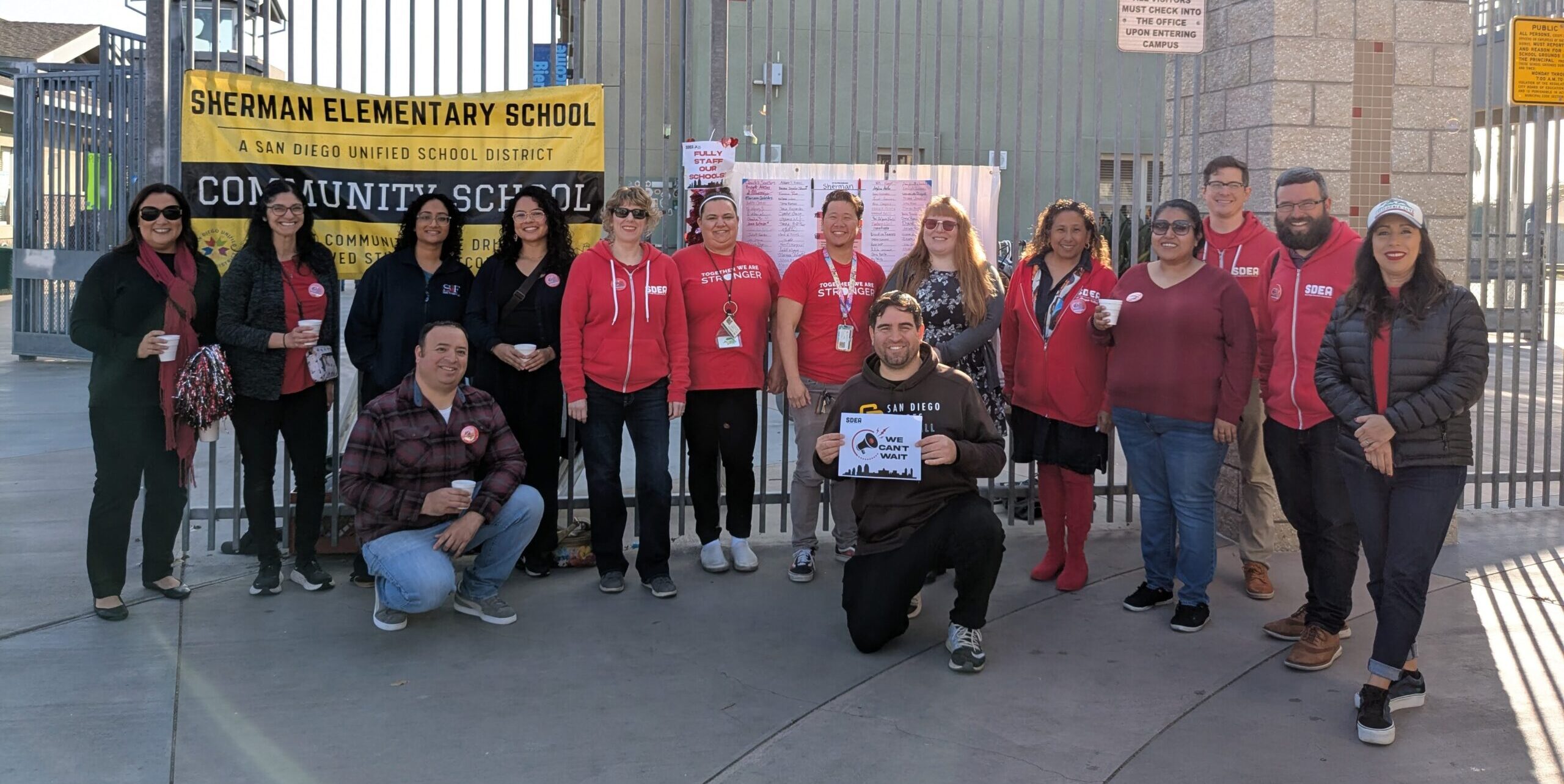
Paloma recently attended a walk-in and rally at Sherman Elementary, to hear from SDEA educators, families, and community partners from the Education Justice Coalition.
Update: Ed Specialist caseload grievance
Still waiting for a fair settlement: An update to the Ed Specialist caseload grievance
SDEA members who were over caseload during the 2023-24 school year and those currently over caseload are still waiting on a fair grievance settlement. The District’s most recent offer still underpays many members compared to past years.
The District is still proposing flat stipends for ranges of overages rather than a per-student, per-week amount. Their data is not reliable enough to report exact overages across the school year accurately, so ranges (caseloads of 21-23, 26-27, etc) would allow members to be paid more efficiently without extensive paperwork to correct even small errors in how many students were actually on their caseload. SDEA leaders have submitted a counterproposal that would maintain the District’s proposed structure of ranges, but which raises the stipends for each range to be more equivalent to what members were paid in past settlements. SDEA’s higher monetary proposal is still less than what the District would be spending if they were adequately staffing all the SPED vacancies and keeping educators from being overloaded.
Read the full counter below, along with past proposals:
- March 11, 2025: SDEA Counterproposal
- February 25, 2025: SDUSD Counterproposal
- January 15, 2025: SDEA Counterproposal
- December 9, 2024: SDUSD Proposal
Note: The settlement proposals contain references to Exhibit A and B (a list of eligible members) and a Caseload Grievance Appeal Form. Those do not yet exist and will be released after an agreement is reached. The process of generating the list of eligible members (and ensuring no one is left off that list!) can begin after the details of the settlement are finalized.
Special Education staffing is a crisis that needs more than delayed band-aid grievances.
Along with continuing to push for fair compensation for caseload overages, SDEA members are bargaining for more concrete solutions. The Bargaining Team has already proposed an increased stipend for Ed. Specialists, and at the next session on March 27 they will be proposing changes to Article 29: Special Education. As bargaining continues we will need to maintain pressure to fully staff our schools and ensure our students have the support they need.
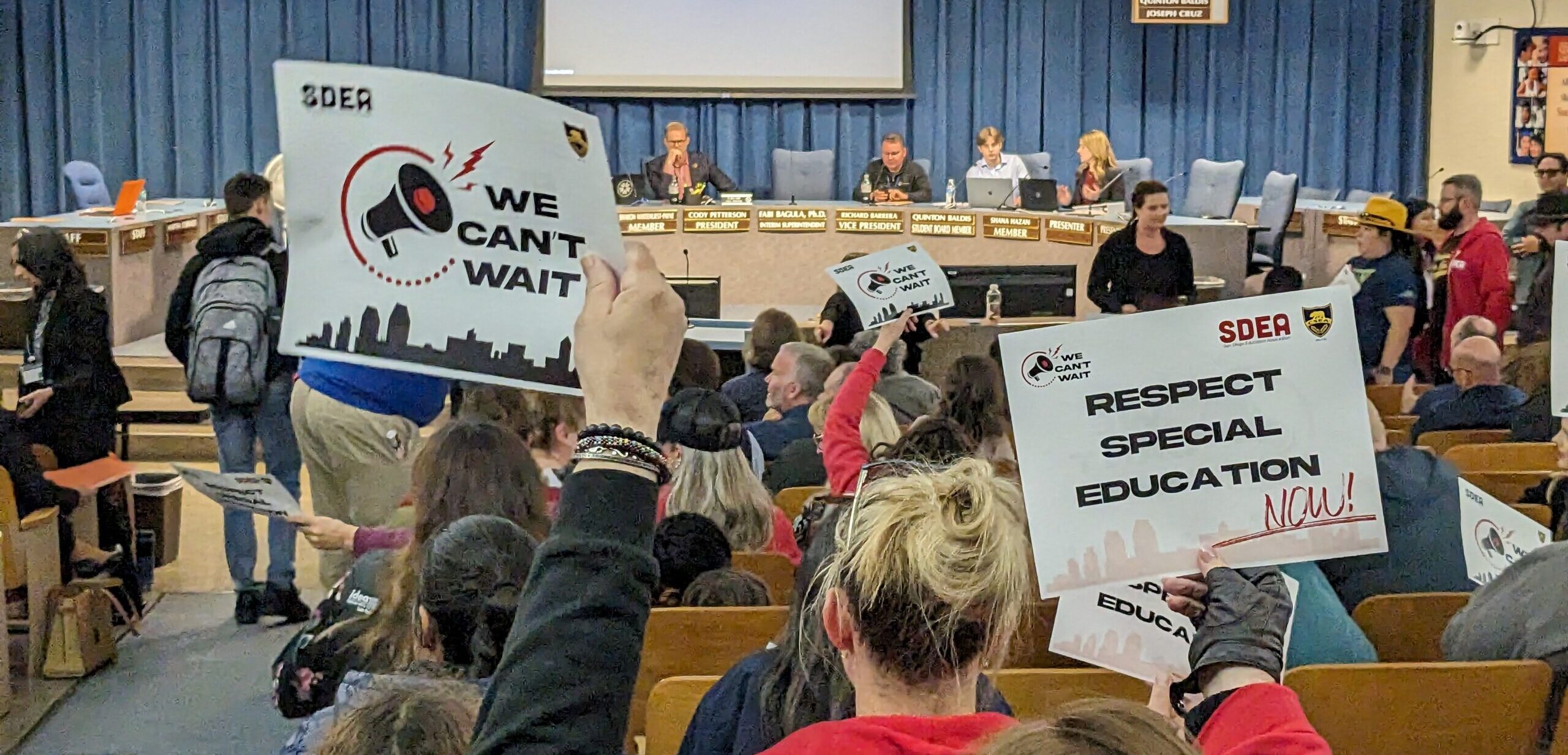
SDEA members will need to make District leadership aware of the student impact of staffing shortages.
Students and educators are the ones impacted by the understaffing of Special Education, and in January SDEA members and classified colleagues showed up to make that clear! In April, we plan to meet with SDUSD Board Members so that they can share the urgency to solve this crisis with Ed Specialists who have been over contractual caseload limits month and month, year after year. Stay tuned for updates, show up at site actions in support of bargaining, and let’s keep the pressure on: Fully Staff Special Education NOW! We Can’t Wait!
Last Call for Elective Session Presenters - CTA Summer Institute, IPD Strand
The CTA Instruction and Professional Development (IPD) department is looking for presenters for our IPD Strand at the 2025 CTA Summer Institute. The theme of the IPD Strand will be “Creating Safe and Supportive Classrooms for Students and Educators II,” revisiting and expanding on the theme of our popular 2024 IPD Strand. APPLICATIONS DUE MONDAY, MARCH 24, 2025: bit.ly/IPDpresenter25
The 2025 CTA Summer Institute will run from Wednesday, July 16 to Sunday, July 20, 2025, at the Westin Bonaventure hotel in downtown Los Angeles. On Thursday, Friday and Saturday, we will start the day with keynote speakers and panels focusing on a different aspect of safe and supportive classrooms, followed by elective sessions each day in the afternoon. We are looking for member-led elective sessions that will complement each day’s keynote focus. We typically draw on classroom teachers as presenters for our elective sessions because of their practical classroom experience, but this year’s theme offers an opportunity for members who work as counselors, psychologists, behaviorists, social workers, nurses, and educators working with student and teacher support programs to showcase their best practices as well. Sample ideas for possible afternoon electives are included below. Feel free to develop one of the ideas provided or propose an idea of your own.
- Building deep relationships with students and families
- Classroom management strategies
- At-risk/at-promise practices in classrooms and schools
- Alternatives to punitive and exclusionary discipline
- Restorative Justice/PBS/MTSS programs that support students BEFORE they get to the point of discipline/suspension/expulsion
- Strategies to support and promote attendance
- Chapters organizing around equity and justice in discipline & safety
- Self-regulation strategies for students and adults
- Behavior interventions consistent with child/adolescent/teen neurology/biology
- Trauma-informed practices in classrooms and schools
- Strategies that support social and emotional learning and well-being
- Classroom systems and structures that support all students
- Instructional models that support all students (including UDL)
- Campus-wide systems and structures that support students
- Continuation schools as alternative supportive settings
- Systems and structures that support adults
- Chapters organizing around academic issues and safety/support issues
- Community schools as a vehicle for safe and supportive schools/classrooms
Elective sessions will be 90 minutes each, although we’re not looking for 90 minutes of lecture; instead, a mix of content, discussion and time for participants to engage with the content would be ideal. Please keep in mind that we need to offer elective options that will appeal to elementary and secondary teachers (as well as, ideally, preschool and community college teachers), and general education teachers, special education teachers, and other student support professionals.
For selected elective session presenters, the IPD department will pay for 2025 CTA Summer Institute registration for the IPD Strand (full conference), including meals and a single occupancy room in the Westin Bonaventure hotel, and travel (car mileage or an economical flight + taxi/shuttle/Uber/Lyft to and from the airport).
If you are interested in presenting an elective session as part of the IPD Strand at the 2025 CTA Summer Institute, please complete and submit the following interest form by Monday, March 24, 2025, including:
- Presenters' names, home email addresses, and current assignments
- Proposed session title
- What grade levels and settings your session would be appropriate for
- Description of the proposed session
- Any limitations on your availability July 16-20, 2025
Link to form: https://bit.ly/IPDpresenter25
The IPD team will review all interest forms submitted by the deadline and select elective sessions reflecting a range of topics and audiences. Presenters will be notified in April. If you have any questions, please contact Brian Guerrero (bguerrero@cta.org) in the CTA IPD department.
Letters in Solidarity: Fighting for Equity & Support for Our Students
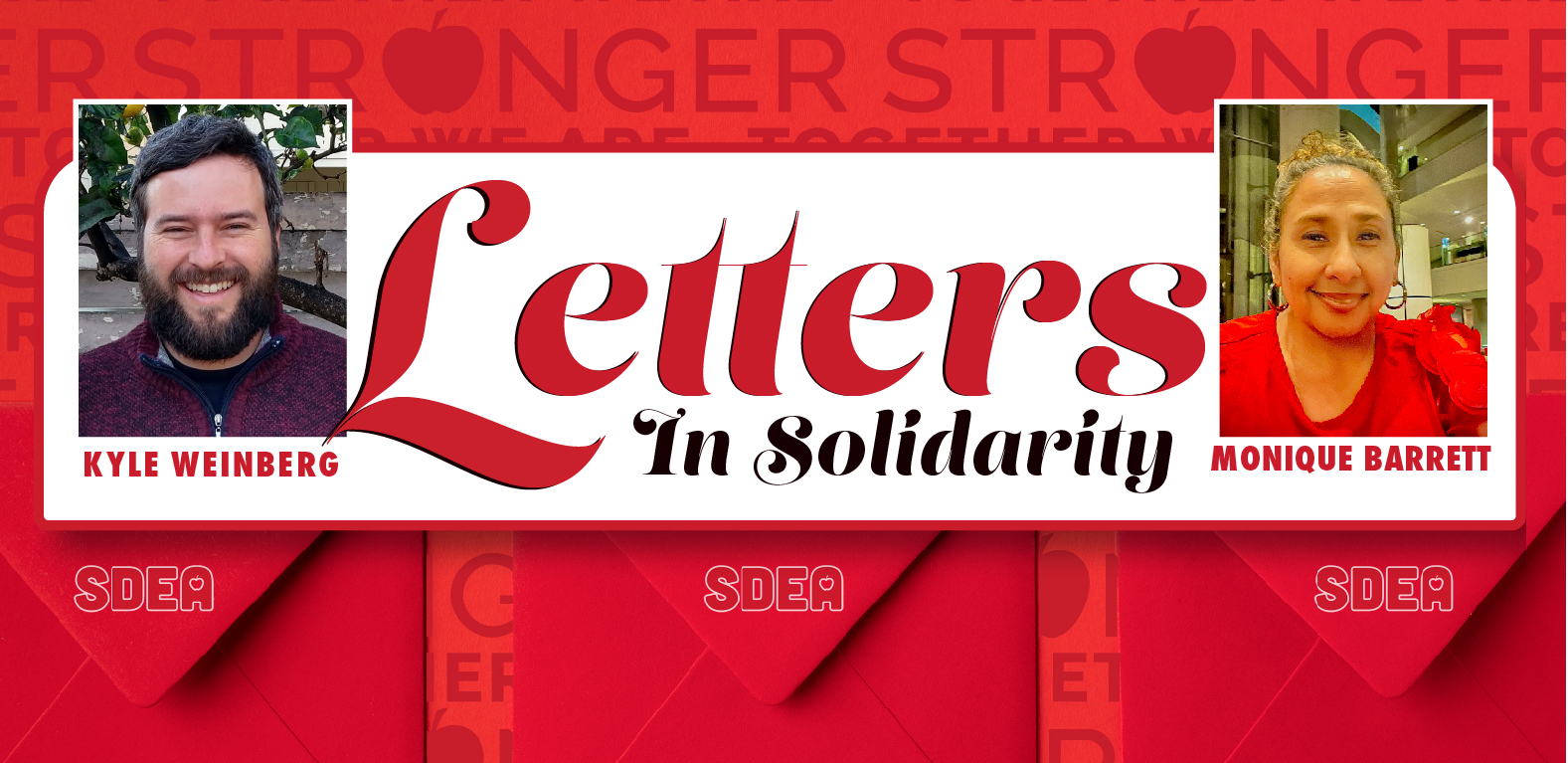
Fighting for Equity and Support for Our Students
As SDEA union educators, we serve the highest-need student population in the county. We know that in order to set our students up for success, we need to address the needs of the whole child inside and outside the classroom. Advocating for the well-being of our students has been a guiding principle for SDEA elected leaders from schools and programs throughout the district as we have voted to adopt several policies in recent years that have oriented us as a fighting, social justice union.
With the constant threats by the new federal administration to target our most vulnerable students and communities, the impact of politics on our schools is undeniable. As a union, we could choose to sit on the sidelines, hoping that more humane values eventually prevail. Our SDEA Board and Representative Council, however, have set us on a path to not acquiesce to the status quo and to instead organize together with union and community allies to secure protections and supports that advance equity and human rights.
We took on this mission when we ratified our contract bargaining platform and collectively committed to fight for the 3 pillars in our statewide We Can’t Wait campaign: fully-staffed schools, improving our pay and stability for our students and communities. Locally, we are building on our history of successful community demands campaigns where we as union educators have joined with families and other members of our education justice coalition to win agreements on community schools, stronger shared decision-making, and affordable housing.
This year, guided by the feedback provided through our SDEA bargaining input process and by coalition partners, we honed in on expanded housing and mental health supports as the community demands for our campaign. At our first bargaining session on February 27, we proposed a new equity article in our contract that includes solutions to address the housing crisis in San Diego that is contributing to declining student enrollment. We also proposed a 10% combined salary increase by 2026 so that we can continue to afford to live near the schools where we teach.
These proposals by the SDEA bargaining team were backed by walk-ins across SDUSD as we chanted, shared our contract campaign platform with families and added signatures to petitions with our demands for the schools our students deserve. Through the participation of thousands of SDEA union educators in our collective actions, we are building the power needed to get the district to prioritize resources for our students and also send a unified message to decision-makers up and down the state that Now Is The Time to reverse decades of disinvestment in public education in California. We Can’t Wait!

2025 Bargaining Kickoff
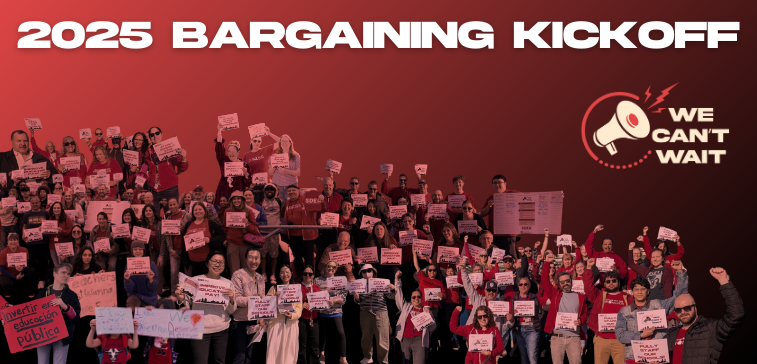
Last week, SDEA members started bargaining for a stronger union contract, demanding fully staffed schools, improved educator pay, & stability for our students. Union educators all over California are also beginning bargaining and gathering community support as part of the statewide We Can’t Wait campaign.
Educators, families, students, and community members showed up #UnionStrong last week!
SDEA members at schools across the District held rallies and walk-ins last week to show solidarity, raise awareness as bargaining began, and gather community support for the fight ahead. Everyone signed giant community petitions in support of the We Can’t Wait platform, and then walked in together in solidarity. See some highlights from across the District:
https://youtu.be/kSSGMZJUbC0
At the bargaining table, SDEA members proposed improvements to pay and stability.
SDEA members on the Bargaining Team met for the first session on February 27, 2025, where they presented 19 proposals focused on improving pay and stability for students and communities - two of the three goals that educators across the state are currently fighting for. Here in San Diego Unified, that means proposals of future and retroactive raises, better benefits and leave policies, equitable compensation for extra work, no more layoffs for the duration of this contract, and a new equity article with protections for our students and educators who are currently targeted by federal policies and threats. Our next bargaining session will be on March 27, when proposals will focus on fully staffing schools. Read the full bargaining update sent to all members after the session, and keep track of more information on the We Can't Wait bargaining information hub.
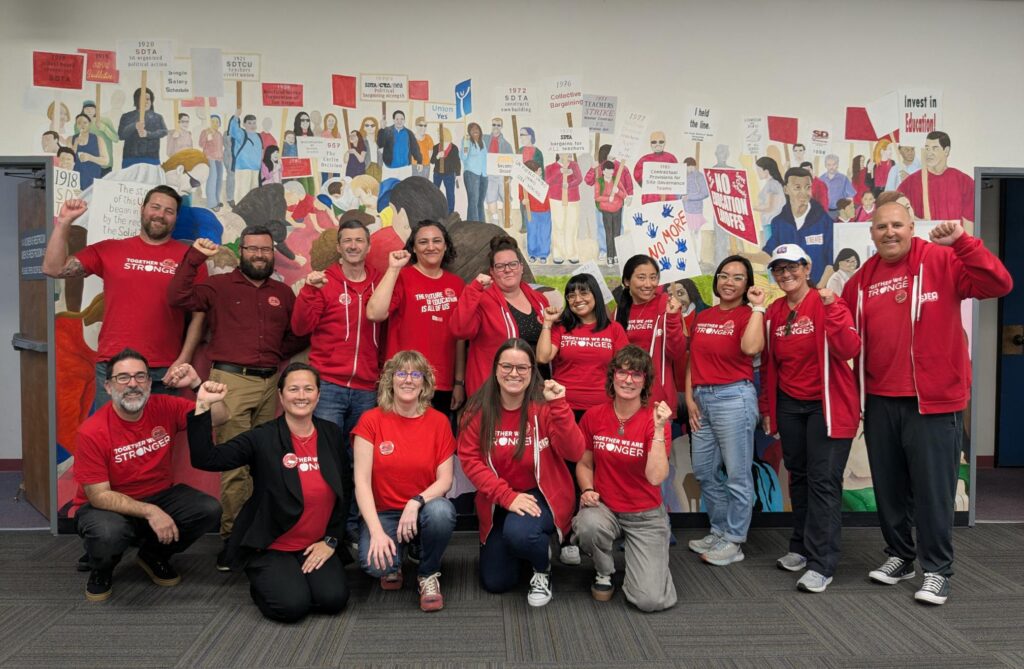
What’s next?
As bargaining continues, SDEA members will continue building their site-based union power with rolling pickets starting in late April. Make sure to attend your next union meeting to find out more! With daily threats to federal funding in the news, it’s clear that this won’t be an easy fight. It’s more important than ever to advocate for public education, and to bring along families and community members to join us in our fight!
Dream Big: Fund your projects with an IFT Grant!
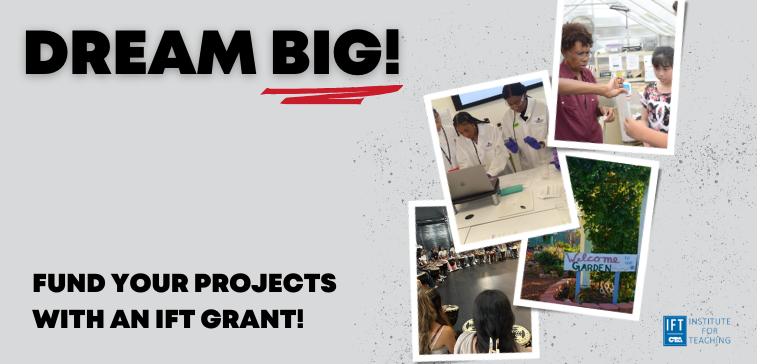
Did you know that union membership can help fund innovative projects in your classrooms and schools? CTA’s Institute for Teaching (IFT) Grants are a key part of the IFT’s mission to support public educators, students, and communities. These funds help educators turn big ideas into real impact, and are available to all SDEA members as part of our statewide affiliate. Could your classroom or school be next?
See these grant funds in action:
$20,000 is currently fueling a leadership program at Morse High School
SDEA members Maria Miller and Sonja Taylor received a $20,000 grant for their project, “Black and Brown Girls United to Heal” at Morse High School. Their project addresses the underrepresentation of young girls in leadership positions, and provides a program full of leadership development opportunities for girls to develop confidence, self-esteem, a stronger sense of belonging, and leadership capacity. Participants were invited through a collaboration with Morse’s counselors, Restorative Justice Coordinator, and Wellness Center Coordinator. This project is still ongoing, and the participants are holding a “Glow & Grow Gathering” event as a culmination of the project on Saturday, May 10th - RSVP if you’d like to attend and support!
“CTA really wants to provide educators access to resources to make projects come true,” said Maria Miller. “No project too small or too big! Educators have permission to dream without limits for students.”
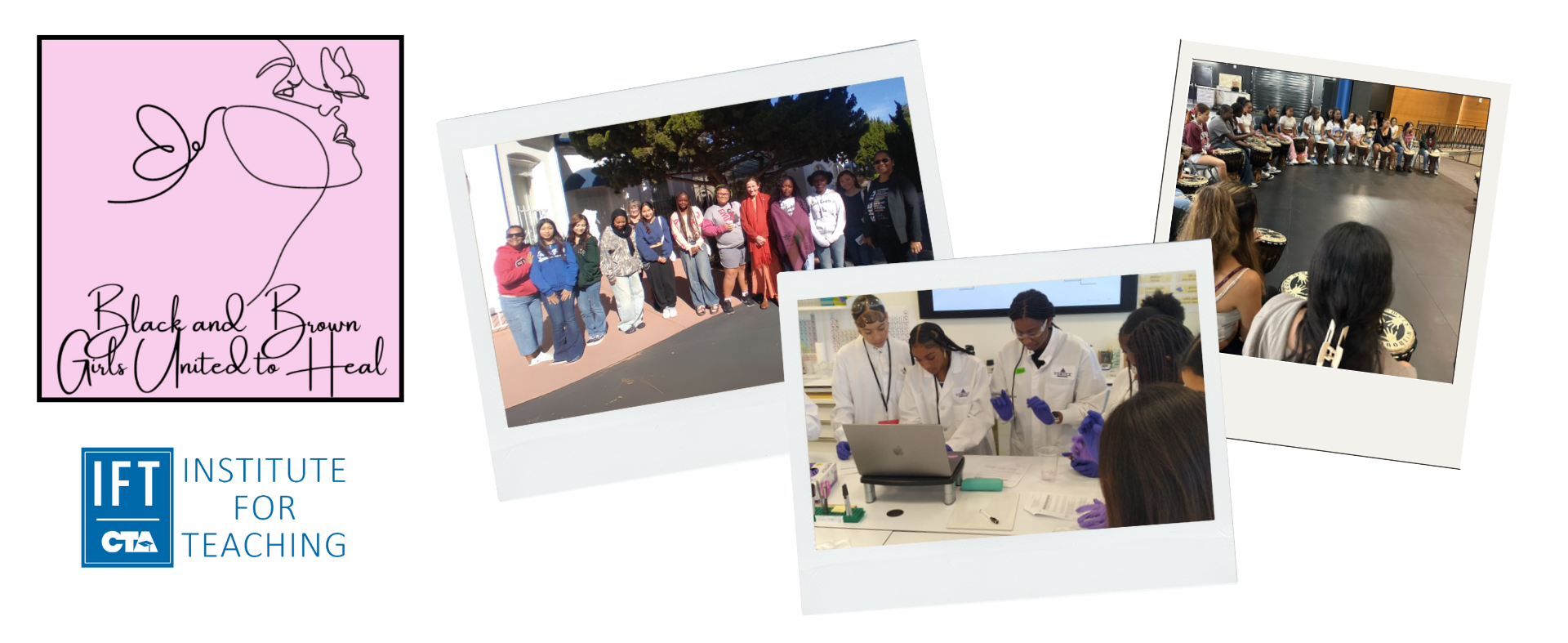
$20,000 helped kick off a School Garden & Comprehensive Health and Wellness Program
SDEA member Emalyn Leppard got an IFT grant for Montgomery Middle STEAM Magnet School’s Comprehensive Health & Wellness Program - most recently, a $20,000 grant for the 2018-19 School Year to build on previous grants. This funding helped the Health & Wellness Program grow into a thriving collaboration of parents, teachers, university students, and community partners, which is still ongoing long after the initial grant period. Funds were used for a school garden, aquaponics system, and revitalized school kitchen, so students could grow and cook healthy meals, see real-world examples from their math and science lessons, and participate in monthly Family Dinner Nights to celebrate diverse cultures through food.
See the school garden and Family Dinner Nights in action in this 2 minute video:
https://www.youtube.com/watch?v=gU1ChVr7m1A
Today, Emalyn is “semi-retired,” but still involved in the school garden (now named after her!) as a Visiting Teacher and as a support for teachers and college interns. She’s also a garden coordinator at the Sage Garden Project, which funds and supports garden and cooking programs for elementary schools - not just as electives or after-school programs for a few students, but as comprehensive programs for every kid during the school day, run by trained (and compensated) educators. She’s a fierce advocate for school gardens for everyone, including advocating at the state level where SB 341 was recently introduced to support school gardens all over California.
“IFT grants were a game changer,” said Emalyn Leppard. “Dream big! If you’ve ever wanted to do something outside the box, this funding makes it so easy to follow that dream. You don’t have to submit requests through the District, and SDEA does all the bookkeeping so you get reimbursed quickly. I was able to pay stipends for a team, including a retired credentialed teacher to help run the program and a community member to help make connections to families who I wasn’t able to connect with on my own.”
Read CTA’s highlight of Emalyn Leppard and this project!

Follow the Montgomery Middle School Community Garden on Facebook to see the ongoing garden!
What could an IFT grant fund in your classroom or school?
What big dreams do you have for your classroom or school? Could these dreams become a reality with the support of funds from an IFT grant?
Applications are still open for Institute for Teaching (IFT) Grants to fund projects in the 2025-2026 school year. The deadline is March 31, 2025. Learn more and apply at cta.org/ift-institute-for-teaching.
Grant opportunities include:
- Environmental Education Cohort (NEW!): Up to $5,000 (Environmental Educator Grant) or $20,000 (Environmental Impact Grant) for projects focused on environmental education, plus networking opportunities and an in-person convening!
- Educator Grant: Up to $5,000 for individual educators to impact a classroom or group of students.
- Impact Grant: Up to $20,000 for teams of two or more educators (three recommended) to make an impact across multiple classrooms or school sites.
Get inspiration & support:
Not sure what this funding could look like in your school or classroom? Check out more examples of projects funded for the 2024-25 school year and the 2023-24 school year.
You can email ift@cta.org with questions, and check out the IFT website for lots more information (including an opportunity to schedule a one-on-one meeting to brainstorm with a Grant Project Coordinator!)




